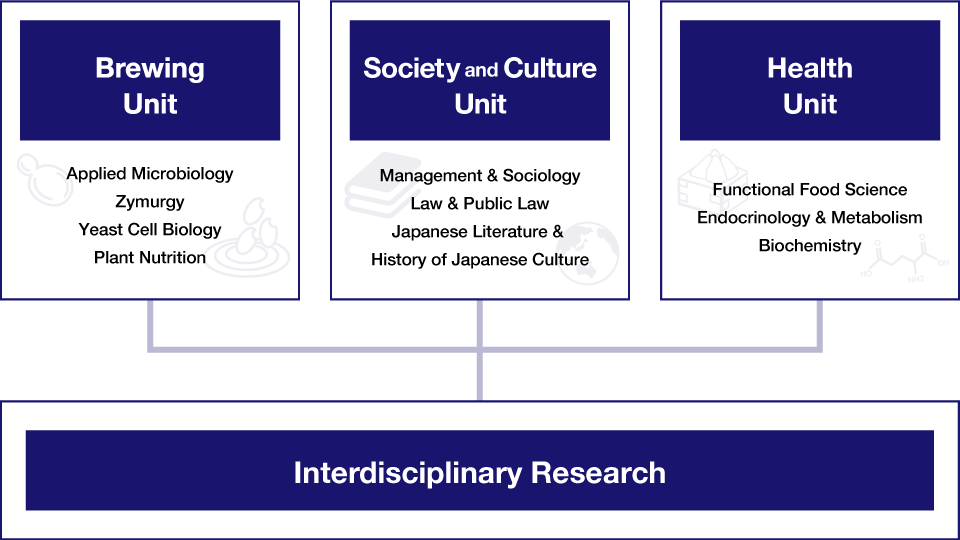 RESEARCH
RESEARCH


We are studying in a variety of fields related to sake in three research units, "Brewing," "Society and Culture," and "Health." Our research covers raw materials (water, sake rice, etc.), microorganisms, brewing and fermentation, and distribution, sales and marketing until sake reaches the hands of consumers. It also covers climate and natural features related to brewing, regional characteristics such as the Geographical Indication System (GI), history, culture, liquor taxation, brewing equipment, manners, and health effects. In addition to the specialized research in each unit, we will promote interdisciplinary research.
- All
- Brewing
- Society and Culture
- Health
- Interdisciplinary Research
Theme
-
Interdisciplinary ResearchResearch on the relationship between rice production and sake making
-
Interdisciplinary ResearchResearch on health benefits of alcoholic beverages as the base for medicinal liquor: Interdisciplinary collaboration between humanities and natural sciences
-
BrewingResearch on water
-
BrewingResearch on rice
-
HealthThe relationship between alcohol consumption and many diseases including diabetes
-
HealthStudy on components in sake brewing products and their health benefits
-
Society and CultureClarifying the Semantic World of Sake
-
BrewingResearch on yeast
Overview
Brewing Unit
【Unit Leader】
HIRATA Dai
Vice director, Sakeology Center / Professor, Faculty of Agriculture
【Research Summary】
Sake is made from the raw materials, rice and water, and is brewed by a unique mechanism called parallel double fermentation, using mainly two types of microorganisms (koji mold and yeast). In detail, two processes, the saccharification of rice starch to glucose by enzymes produced from the koji mold and the production of ethanol from glucose by the yeast, proceed simultaneously in the moromi mash. In the Brewing Unit, we study these multiple factors related to sake brewing.
Theme
Overview
Society and Culture Unit
【Unit Leader】
KISHI Yasuyuki
Vice Director, Sakeology Center / Associate Professor, Faculty of Economic Sciences
【Research Summary】
The consumption of sake is not limited to mere liquid consumption of alcohol (functional consumption), but also significantly related to "semantic value" such as the consumption of meaning and information. In order to understand sake, narrative and story-telling becomes more important. In the Society and Culture Unit, we aim to clarify the semantic world of sake from the aspects of economy, society, history, and culture through approaches from the humanities and social sciences.
Theme
Overview
Health Unit
【Unit Leader】
KAKIHARA Yoshito
Sakeology Center / Assistant Professor, Faculty of Dentistry
【Research Summary】
Sake is a traditional fermented beverage that has been enjoyed by the Japanese as well as people in other countries for centuries, but research on its impact on human health remains unclear. In the Health Unit, we study the health benefits of sake and its by-product, sake lees, and explore the physiological mechanisms of the bioactive compounds in them. Using medical big data, we also investigate the relationship between alcohol consumption, including sake, and lifestyle-related diseases such as diabetes.
Theme
Overview
Interdisciplinary Research
【Research Summary】
In addition to research by the center’s faculty members, faculty members from various fields are cooperating to deepen interdisciplinary research on sake through mutual collaboration.
